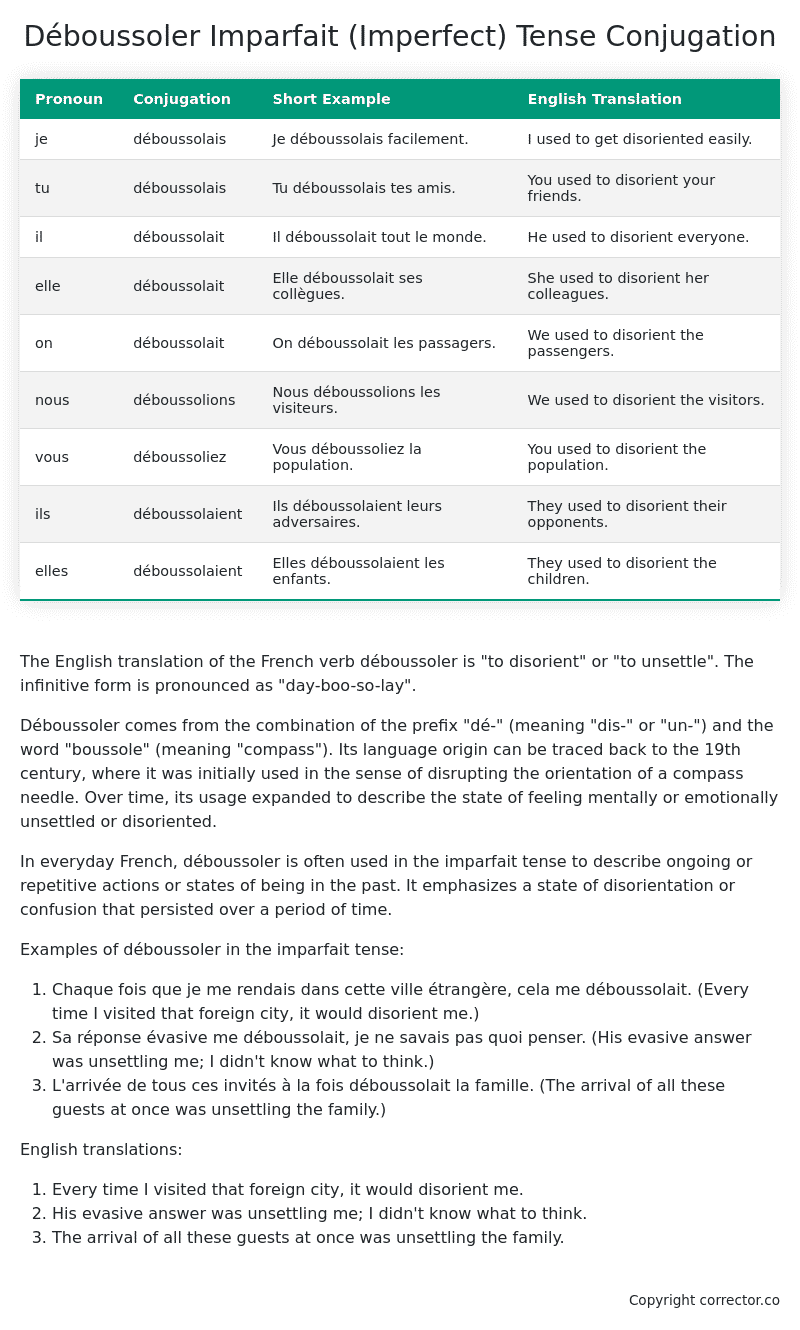Imparfait (Imperfect) Tense Conjugation of the French Verb déboussoler
Introduction to the verb déboussoler
The English translation of the French verb déboussoler is “to disorient” or “to unsettle”. The infinitive form is pronounced as “day-boo-so-lay”.
Déboussoler comes from the combination of the prefix “dé-” (meaning “dis-” or “un-“) and the word “boussole” (meaning “compass”). Its language origin can be traced back to the 19th century, where it was initially used in the sense of disrupting the orientation of a compass needle. Over time, its usage expanded to describe the state of feeling mentally or emotionally unsettled or disoriented.
In everyday French, déboussoler is often used in the imparfait tense to describe ongoing or repetitive actions or states of being in the past. It emphasizes a state of disorientation or confusion that persisted over a period of time.
Examples of déboussoler in the imparfait tense:
- Chaque fois que je me rendais dans cette ville étrangère, cela me déboussolait. (Every time I visited that foreign city, it would disorient me.)
- Sa réponse évasive me déboussolait, je ne savais pas quoi penser. (His evasive answer was unsettling me; I didn’t know what to think.)
- L’arrivée de tous ces invités à la fois déboussolait la famille. (The arrival of all these guests at once was unsettling the family.)
English translations:
- Every time I visited that foreign city, it would disorient me.
- His evasive answer was unsettling me; I didn’t know what to think.
- The arrival of all these guests at once was unsettling the family.
Table of the Imparfait (Imperfect) Tense Conjugation of déboussoler
| Pronoun | Conjugation | Short Example | English Translation |
|---|---|---|---|
| je | déboussolais | Je déboussolais facilement. | I used to get disoriented easily. |
| tu | déboussolais | Tu déboussolais tes amis. | You used to disorient your friends. |
| il | déboussolait | Il déboussolait tout le monde. | He used to disorient everyone. |
| elle | déboussolait | Elle déboussolait ses collègues. | She used to disorient her colleagues. |
| on | déboussolait | On déboussolait les passagers. | We used to disorient the passengers. |
| nous | déboussolions | Nous déboussolions les visiteurs. | We used to disorient the visitors. |
| vous | déboussoliez | Vous déboussoliez la population. | You used to disorient the population. |
| ils | déboussolaient | Ils déboussolaient leurs adversaires. | They used to disorient their opponents. |
| elles | déboussolaient | Elles déboussolaient les enfants. | They used to disorient the children. |
Other Conjugations for Déboussoler.
Le Present (Present Tense) Conjugation of the French Verb déboussoler
Imparfait (Imperfect) Tense Conjugation of the French Verb déboussoler (You’re reading it right now!)
Passé Simple (Simple Past) Tense Conjugation of the French Verb déboussoler
Passé Composé (Present Perfect) Tense Conjugation of the French Verb déboussoler
Futur Simple (Simple Future) Tense Conjugation of the French Verb déboussoler
Futur Proche (Near Future) Tense Conjugation of the French Verb déboussoler
Plus-que-parfait (Pluperfect) Tense Conjugation of the French Verb déboussoler
Passé Antérieur (Past Anterior) Tense Conjugation of the French Verb déboussoler
Futur Antérieur (Future Anterior) Tense Conjugation of the French Verb déboussoler
Subjonctif Présent (Subjunctive Present) Tense Conjugation of the French Verb déboussoler
Subjonctif Passé (Subjunctive Past) Tense Conjugation of the French Verb déboussoler
Subjonctif Imparfait (Subjunctive Imperfect) Tense Conjugation of the French Verb déboussoler
Conditionnel Présent (Conditional Present) Tense Conjugation of the French Verb déboussoler
Conditionnel Passé (Conditional Past) Tense Conjugation of the French Verb déboussoler
Conditionnel Passé II (Conditional Past II) Tense Conjugation of the French Verb déboussoler
L’impératif Présent (Imperative Present) Tense Conjugation of the French Verb déboussoler
L’impératif Passé (Imperative Past) Tense Conjugation of the French Verb déboussoler
L’infinitif Présent (Infinitive Present) Tense Conjugation of the French Verb déboussoler
L’infinitif Passé (Infinitive Past) Tense Conjugation of the French Verb déboussoler
Le Participe Présent (Present Participle) Tense Conjugation of the French Verb déboussoler
Le Participe Passé (Past Participle) Tense Conjugation of the French Verb déboussoler
Struggling with French verbs or the language in general? Why not use our free French Grammar Checker – no registration required!
Get a FREE Download Study Sheet of this Conjugation 🔥
Simply right click the image below, click “save image” and get your free reference for the déboussoler imparfait tense conjugation!

Déboussoler – About the French Imparfait Tense
NOTE: To take a deep dive into all the French tenses then see our article on Mastering French Tense Conjugation.
Formation of the Imparfait Tense
For regular -er verbs:
For regular -ir verbs
For regular -re verbs
Common Everyday Usage Patterns
Description of Past Habits
Background Information
Mental and Emotional States
It’s employed to express emotions, thoughts, or physical sensations in the past. For example: “J’étais content quand il est arrivé.” (I was happy when he arrived.)
Ongoing Actions
Points to Note About the Imparfait Tense
Passé Composé vs. Imparfait
Conditional
Si Clauses
Narration
I hope you enjoyed this article on the verb déboussoler. Still in a learning mood? Check out another TOTALLY random French verb imparfait conjugation!


